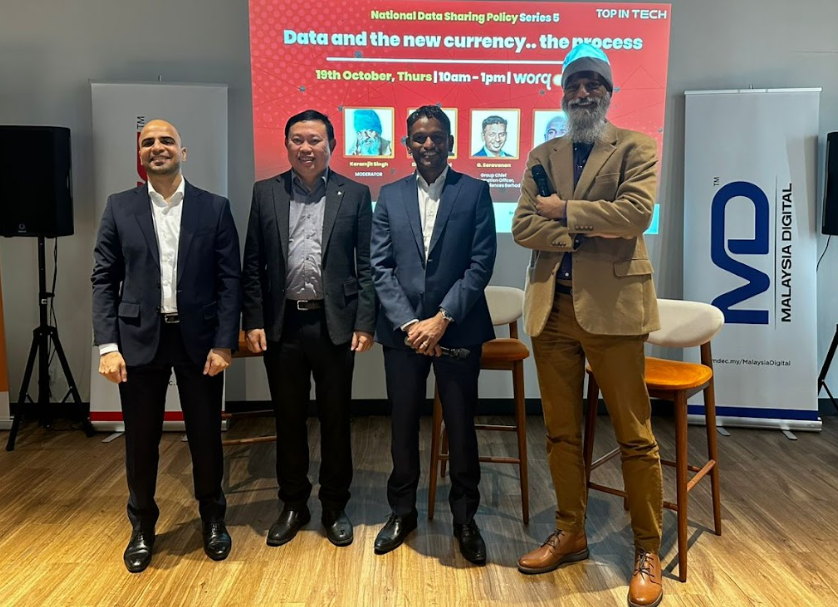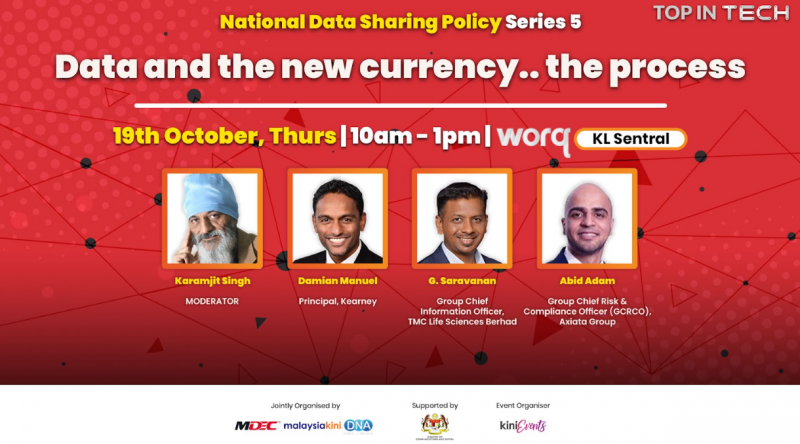Data and the new currency...the process
In 2022, the Government launched the National Data Sharing Policy (NDSP), a visionary policy that transcends boundaries, encompassing the public sector, the private sector, and the Rakyat. This policy holds the key to fostering a data-sharing environment that is not only conducive but transformative.
To raise awareness and gather valuable feedback, we have initiated the NDSP Series – a collaborative effort by the Malaysia Digital Economy Corporation (MDEC), Malaysiakini, and Digital News Asia (DNA), with the support of the Ministry of Communications and Digital (KKD).
This series aims to educate the public about the benefits and challenges of data sharing while gathering opinions and suggestions to enhance the policy and its implementation. Your active participation in these discussions will be instrumental in shaping the data-sharing practices in Malaysia, leading us toward a secure and dynamic digital world.

The 5th Episode of the National Data Sharing Policy, Karamjit Singh, CEO of Digital News Asia, engaged in a discussion with Damian Manuel, Principal, Kearney and Abid Adam, Group Chief Risk & Compliance Officer (GCRCO), Axiata Group, with the session held at WORQ, KL Sentral. Together, they uncover the process behind this transformation especially for businesses and individuals.

The discussion commences with an engaging introduction by Karamjit, setting the stage for a thought-provoking exchange of ideas. As the dialogue unfolds, it pivots around the fundamental premise of data sharing and data protection. A question looms large: "Can we afford not to share data?" This thought-provoking query serves as the fulcrum of the discussion, compelling participants to explore the intricate balance between harnessing the power of shared data for innovation and the imperative of safeguarding privacy and security in an increasingly data-driven world.
Our first panelist, Damian Manuel, provides further insights into Malaysia's distinctive position in the data landscape. He emphasizes the nation's unique combination of talents, capabilities, evolving infrastructure, and its journey towards becoming a developed nation. This perspective underscores the potential and opportunities that Malaysia possesses in harnessing data for its growth and development, highlighting the promising future that lies ahead for the country as it continues to build its data-driven ecosystem.
Malaysia's Data-Driven Transformation: Accelerating Towards Developed Economy Status
Abid Adam sheds light on the evolving landscape of traditional businesses. He highlights the significance of adopting advanced technologies such as artificial intelligence (AI), blockchain, Internet of Things (IoT), virtual, and augmented reality to stay competitive in an environment where traditional markets are experiencing single-digit growth. Abid's perspective underlines Malaysia's transition from an emerging economy to a developed one, pointing out that the country's progress in the digital economy has been rapid, surpassing that of many other nations.
Karamjit chimes in, drawing attention to Malaysia's proactive approach in the field of data analytics. He mentions the National Data Big Data Analytics framework launched in 2014, highlighting the significant groundwork undertaken prior to its launch. “This foresight and commitment to ethical and effective data utilization reflect Malaysia's dedication to staying at the forefront of data-driven progress.”
Damian underscores the pivotal role of data in the contemporary business landscape. He highlights the significant shift that has taken place in the top 10 global companies by market capitalization over the past decade, where traditional companies have been outnumbered by digital natives. This transformation underscores the indispensability of data in reshaping the global economic landscape. Damian also addresses the question of how to promote data governance among non-tech companies, emphasizing the importance of building a robust data infrastructure; “The foundation of data governance involves elements like network infrastructure, storage systems, and the necessary tools to enable a data-driven ecosystem. Additionally, he discusses the importance of scaling data, representing the next layer in the journey towards effective data management”. Hence, this comprehensive approach to data governance not only ensures data quality and security but also positions organizations to thrive in the data-driven era. The process involves aggregating data from various sources, ensuring its consistency, and then consolidating it into a single dataset, enabling the creation of personalized products tailored to individual usage patterns.
Strategies for Effective Data Preservation and Management in the Modern Business Landscape
Abid Adam offers valuable insights into the preservation of digital information, particularly when dealing with storage platforms that may become outdated. He emphasizes that such initiatives should ultimately benefit both the business and its customers, underlining the importance of a two-way street. Abid also highlights the necessity of making strategic investments in this process, starting with a crucial consideration: the volume of data. “Striking the right balance between collecting too much or too little data is essential”. Moreover, he emphasizes the importance of deciding whether real-time data or batch processing is required, based on the specific needs of the business. Abid advises starting with a simple framework before embarking on the journey of significant investments in time, money, and resources, ensuring a thoughtful and efficient approach to data management and preservation.
Abid's insights shed light on the enduring principles of data management amidst the ever-evolving landscape of data storage. He emphasizes the significance of comprehending and adopting established standards that have evolved over time, as they serve as crucial benchmarks for data handling. Maintaining a firm grasp on these standards and the companies responsible for underlying infrastructure development is essential for effective data transfer and ensuring the seamless storage, archiving, and retrieval of information. Abid also draws attention to the persistent challenge of inconsistency during data migration, which often necessitates the maintenance of multiple software systems for data recovery. In response, he recommends a tailored approach, encouraging organizations to consider their specific industry or vertical and thoroughly understand the legal requirements that can shape their data management practices.
During the concluding segment of the discussion, Damian tackled a question of paramount importance in the data-driven world: how to strike a balance between data privacy and data monetization. Damian outlined the need to establish a framework that facilitates responsible data sharing, primarily involving two key players which are consumers and private enterprises. Consumers have a vested interest in safeguarding their personal information and data, emphasizing the importance of stringent privacy measures. On the other hand, private enterprises seek regulations that enable them to conduct business and leverage data monetization for growth. Striking the right balance becomes crucial, with a strong emphasis on personal data protection while also fostering an environment conducive to business and innovation. Damian suggests that Malaysia can draw from the experiences of other countries to determine how best to harmonize these interests and create a framework that serves both individual privacy and economic growth.
Watch the full webinar HERE Data and the new currency… the process
Share your thoughts by taking the survey HERE and test your knowledge by taking the quiz HERE
This article is provided by KiniEvents
RM12.50 / month
- Unlimited access to award-winning journalism
- Comment and share your opinions on all our articles
- Gift interesting stories to your friends
- Tax deductable
